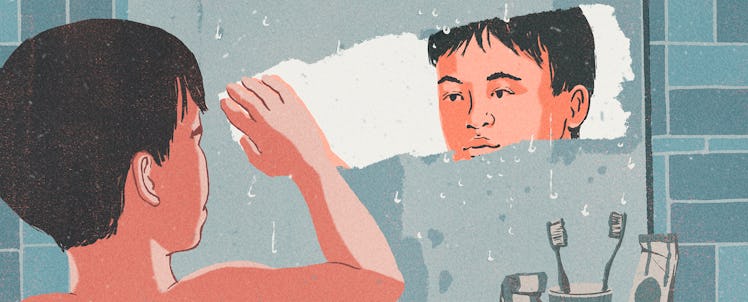Karamo Brown: A Letter to My Son About What It Means to Be a Man
When we talk about "being a man," it is usually outdated code for emotional stagnation. It shouldn't be. Instead let it be about a process of emotional, mental, and moral growth.

Fatherly’s Letters to Boys project offers boys (and the men raising them) guidance in the form of heartfelt advice given generously by great men who show us how to take that crucial first step in confronting seemingly unsolvable issues — by offering honest words. Read all the letters here, or share your own.
Dear Jason,
By this point, you’ve stopped growing physically. You’re 21, and I doubt you’re going to be any taller (which is fine; you already tower over me). But you’re going to keep growing: Emotionally, mentally, morally. This never stops, and it never should.
Every day, I look at myself in the mirror and decide if I am going to be better to myself, my family, to the world. I ask myself, “What does it mean to be a better man today?” It’s that single question that challenges me and motivates me to think critically about my actions, how I am impacting others, how I can do better.
I grew up scared of growth, scared to be introspective because I feared it would be dismissed by the men around me. My father and uncles were raised in a time that dictated any man who was curious about life, creativity, or compassion was somehow not acting “man enough.” Emotional growth was not an option for them. Neither was straying from their idea of gender norms. To them, being close to someone who self-identified as a member of the LGBT community meant you were “guilty by association.” Being surrounded by this thinking slowed my growth in life.
It was around my 16th birthday that I first recall really breaking the cycle. I saw a classmate being belittled by a couple of guys on my football team because he was crying. Real men don’t cry, they seemed to be saying. But there he was, a man crying, and there was no one standing up for him. For the first time, I saw I could have an impact in my world, I could create change. I spoke up. My teammates teased me, but they stopped bullying this young man. As they walked away, he turned to me with a slight smile and said, “Thank you.” Now, I knew. A man doesn’t sit by and not try to help others in need. My world got a bit bigger.
You’re getting close to the age I was when I went on The Real World. You saw the show. You saw that, at 23 years old, your dad still had many challenges in life. The beautiful part of my experience is that I grew with an audience. People have actually seen my growth. You, my son, can see my growth. You can see me change from someone who was caught up in their own head to someone who can be an empathetic listener, who is taking care of themselves, and wants to encourage everyone to do the same. I think that’s reassuring for a lot of people. It also gives me the mindset that I know that I’m in the right space and at the right time, and that I’ve put in the work.
Every day, I put in the work. I check my behavior to see if it is mimicking my forefathers, many of whom were misguided in their approach to being a man. If I see that some part of my behavior is closing me off from being who I want to be or is causing me to hurt others, I stop, acknowledge what I am doing, apologize to myself or the other person, and begin to practice better behavior.
See, being a man isn’t an inherent thing; it’s something you put into practice. It means trying each day to be better for yourself and others. It means not stopping emotions because of fear and not hurting others because that’s how you were trained. It means knowing that you have the choice each day to listen to others and see how your behavior is affecting them, and truly respecting how they feel. It means looking at how you’re treating yourself daily and doing more to be true to who you are. And lastly, it means making sure the next generation doesn’t have to subscribe to an outdated ideal of what a man is.
Love,
Dad
Karamo Brown is a TV personality (best known as the “Culture Guy” on Netflix’s Queer Eye), and author of Karamo: My Story of Embracing Purpose, Healing, and Hope and a children’s book, I Am Perfectly Designed, which he co-wrote with his son Jason. Karamo lives in Los Angeles with his fiancé, Ian Jordan. He has two sons, Jason and Chris Brown.
This article was originally published on